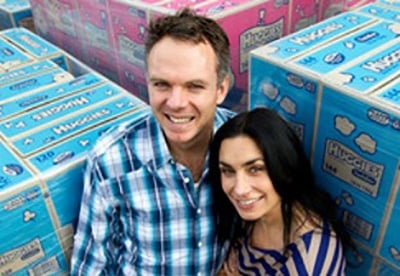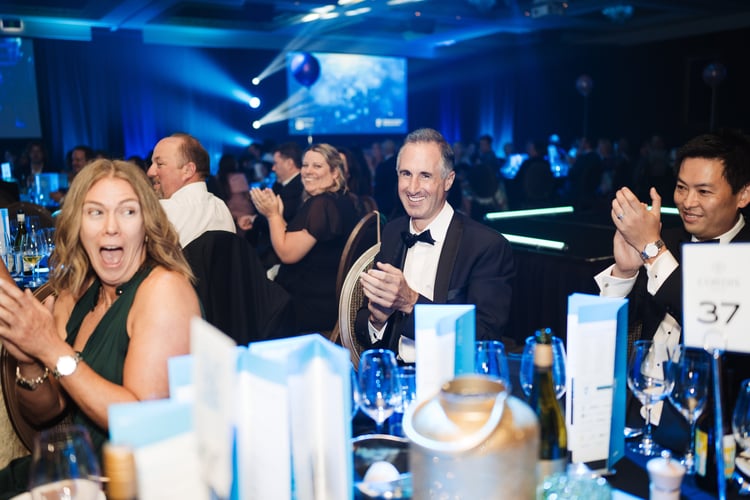“Survive until 2025” isn’t a mantra that Olivia Blaylock would recommend business owners get behind.
The new chief executive of The Icehouse says those in business should be taking a longer term view, and instead focus on looking for opportunities to thrive—whether that be through innovation, moving on chances to collaborate with other brands, or asking for help.
Current economic conditions are deeper and harder than many anticipated, with the flow-on effects to business believed to be worse than that of the global financial crisis (GFC).
But Blaylock believes relief is around the corner, with interest rates already cut this month, and potential further cuts which could deliver much-needed relief for businesses this side of Christmas.
“It’s hard out there, and particularly when for lots of small businesses their businesses are tied up with their mortgages. But, if you can keep your eye on the prize, I think there is definitely light coming,” says Blaylock, who took over the reigns as head of the small and medium sized business development group at the start of July.
Blaylock joined The Icehouse a year ago as chief growth officer, leading the sales, marketing and partnership teams. She has kept the sales responsibility as chief executive, and leads a team of 20.
The former business owner knows first hand how tough being in business can be. The group hosts programs and workshops to upskill and coach business owners and leaders, on topics such as leadership, financials and sales.
Milford-based Blaylock went through The Icehouse’s owner manager program in 2011. She sold her sales and leadership training business David Forman three years ago.
It's hard out there, and particularly when for lots of small businesses their businesses are tied up with their mortgages. But, if you can keep your eye on the prize, I think there is definitely light coming.
Olivia Blaylock
On Friday, the Aucklander will be on her way to Stanford University in the United States to undertake a short executive leadership course on growing companies, to further upskill herself. She says it will put her in good stead to do the same with the business owners she comes into contact with in her new role.
About 200 businesses go through Icehouse programs and coaching each year, and about 4000 in its 23-year history, everyone from fashion designers to grocery store owners, engineers to plumbers.
“Business is tough at the best of times. And right now, for most it’s even tougher. But knowing that you’ve got a cohort of peers that get it is really important,” says the 50-year-old.
“It’s important business owners understand their numbers like they never have before, ensure that they’ve got their people structured correctly and are clear on what it is that makes them different.”
Icehouse recently signed up to TikTok and is looking at ways to stay relevant and reach business owners of all ages and demographics. It also launched a one-day boot camp to address pain points around finances and organisational structures.
Blaylock says businesses that work with Icehouse grow at two-and-a-half times the rate of those that don’t, measured against Stats New Zealand data on revenue, export and full time equivalent growth.
The not-for-profit organisation was set up in 2001 and was an offshoot of the University of Auckland business school and industry, founded by David Irving, the then former chief executive of Heinz Wattie’s in Australia and New Zealand.
Five years ago Icehouse and Icehouse Ventures, the start-up division, split into two separate entities, run by separate boards.
The Nelsonian-turned-Aucklander says joining Icehouse was an opportunity to “give back to an organisation that gave so much to me as a business owner.”
Blaylock typically starts her day in the Parnell office early to beat the Auckland traffic.
She describes herself as a decisive and all-hands-on-deck chief executive. It’s a flat structure at the organisation, and so if she’s the first in the office she’s the one to turn on the music and lights.
During her tenure, she hopes to grow the impact Icehouse has on helping businesses grow. “We want to contribute to New Zealand Inc’s overall goals, producing more productive businesses.”
Prior to Icehouse, Blaylock owned and ran David Forman with her husband Stuart for 12 years. Before that, she was in sales and marketing.
She started her career at Mainfreight, and went on to work in marketing at Trade New Zealand, before it was New Zealand Trade and Enterprise. Then Telecom—where she quickly learned that the corporate world was not for her.
“I’m pleased I had a corporate experience and learned great disciplines, things like business cases, and I joke how to use PowerPoint, and the ability to influence. But it just wasn’t the greatest environment for me.”
From Telecom she moved to the Child Cancer Foundation, where she was as general manager of marketing and fundraising. During her time there she introduced the beads of courage that are still used today.
“It was an amazing experience and a real privilege to be help raise money for something that I still find hard to believe is not government funded; supporting families with kids with cancer. I grew the Child Cancer Foundation to become the most preferred children’s charity in New Zealand and won numerous awards for what we did, but ultimately what matters is we got more money to provide more support for kids.”
She describes working for the charity as a pivotal time in her career. “You can get caught up in the everyday, but actually when you see kids going through that, it puts life into perspective.”
Another pivotal moment, she says, was working at Trade New Zealand where she gained an understanding of the scale and calibre of businesses founded in Aotearoa.
“I feel like what I’m doing now loops that back together too, helping businesses grow—to either grow to be more capable to export or to be able to defend their position against international competition.”
During the GFC, Blaylock and Stuart decided they wanted to start their own company, but ended up buying established firm, David Forman, which they grew to a staff of 12 with a wider team of contract facilitators and coaches.
“Stuart was the most in-demand facilitator at David Forman, and I’d just won sales and marketer of the year through the work I’d done at the Child Cancer Foundation. We were pretty arrogant and thought we can do this, then ‘Why don’t we buy David Forman that’s got the brand’, so we bought it. It was bloody hard. The accountant said to us we had rocks in our head buying a business that was losing money.
“We didn’t quite realise how much money [it was losing] – it took a lot longer to turn it around than we thought it would.”
Blaylock says it’s hard to understand the intricacies of being in business without having been there yourself.
“When I first started at Icehouse, it was the first salaried job I’d had for 15 years, it felt amazing. It’s a totally different perspective when you’re running a business and knowing that you’re responsible not only to pay for your own family’s meals and mortgage, but sometimes you’ve got five, 10, 50 or 500 other people who are relying on you to do that.
“There’s something unique about not only earning your salary but paying it too. That’s quite a different approach.”
The mother of two sons says there is some relief that she gets paid every month, because when you’re a business owner often you are the last to be paid, or sometimes not at all.
“Although I don’t own Icehouse, I feel responsible for the outcomes and for the team that work for me, and that I’m the custodian of their money. I bring that business owner lens to the role.”
At school she was involved in Students Against Driving Drunk (Sadd). Originally she wanted to be a nurse and studied at Nelson Polytech, but ended up leaving part-way through and returned to Sadd in a full-time paid role.
“I was pretty young; 18, 19, 20 helping grow that organisation around schools and getting kids on board using my influence. That was a position that was funded through Ministry of Transport, health boards and AA. It was an exciting opportunity, and then in Women’s Suffrage year I was lucky enough to receive a scholarship from the Ministry of Transport to go to Lincoln University. I also received a medal for my contribution to community at the Women’s Suffrage Centennial.”
Blaylock studied commerce at Lincoln University and a postgraduate diploma in business at the University of Auckland. She grew up in a working class family. Her mother worked multiple jobs to make sure her children could go to good schools, and her father ran his own business.
Her parents were young when she was born, the middle of three children. When her parents split up, she was raised by her father, something unheard of in the 70s and 80s. Her mother went on to remarry and have four more children.
She says growing up as the oldest daughter of seven siblings shaped her for a future of leadership.
"Although I don't own The Icehouse, I feel responsible for the outcomes and for the team that work for me, and that I'm the custodian of their money. I bring that business owner lens to the role."
Olivia Blaylock
When Blaylock is not at work, she is heavily involved in youth sport—or out with family at most All Black and Black Caps matches. The Manchester United football fan has just bought a family membership to Auckland FC for the upcoming season.
Her oldest son Riley, 24, has moved out of home, but Cooper, 14, keeps her busy. She manages his football team and scores his cricket matches.
Blaylock is sporty herself and into running.
She has ran a number of major marathons, including the New York City Marathon in 2018 and London Marathon in 2022. She has a goal to add more to that list, with the Tokyo Marathon up next.
Her advice for businesses doing it tough right now is: “Don’t just wing it. Look at who you can talk to, there’s probably people within your network that you can tap into, and most people want to help.
“Banks want to know before things turn to custard. They don’t like surprises. Your accountant can help with more than just numbers. Talk to suppliers, people that you’ve previously thought of as competitors, there might be opportunities for you to work together. Don’t try and do it on your own.”
This profile was first published by The Post. Click here to read the original article.




